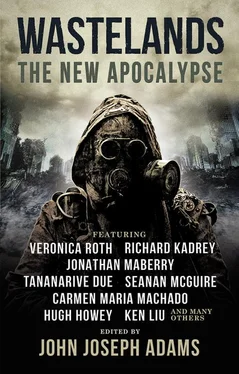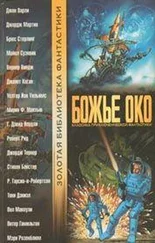I think about those people on their boats when I pull up cassava and when I help with the fishing. Ours was a host family, which meant making these wayward sailors feel welcome, showing them around, giving them cassava and fish and coconuts. They’d often see the cave and peer inside and ask how old the bones were, how long since the last time we practiced our old ways.
“Not since Tuesday,” we’d tell them. And then we’d laugh, our faces all teeth, while their eyes went wide for a moment. It takes a while to get our sense of humor. But that’s no worry; all we have is time.
* * *
The supply ship teaches us patience. Once a month the big boat steams toward us under a chimney of gray smoke, its rusty bow burying into steep seas. It’s a torturous journey. I’ve made it six times, and I’ll never do it again.
When I was twenty-three I left for Suva to get a job and find a wife. Suva is the “big city,” the only place with work and where we might meet a spouse who hasn’t known us since we were born. Someone not a cousin.
But then I got married, and my beautiful Maru got pregnant, and we took a supply ship home to have our first child. This is what we do. We drop off our kids with our parents and leave them to grow like buried cassava. Our parents look after them just as our grandparents looked after us.
We skip a generation here. People who don’t know their own grandparents judge us. It’s different is all. My grandchildren are my everything, just as my grandparents were my sun and moon. I saw my parents at Christmas. That’s when I see my children now.
In this way, an entire generation goes missing from our island: the generation in the middle. Suva is no place to raise kids. Children in the city can’t even open a coconut, and people there pay money for fish that someone else caught! No, our children are born and raised in Fulaga. They go to school until we run out of things to teach them. Afterward, some go off to college in Suva, but not many. Just a few. Most are like me and go there for work one day, or to see what the city is like, or to visit an older brother or sister. Someone has to make money and send it back home. These are the missing. The people in their prime.
When we get old and tired of work and the whizzing cars, we return to the island where we grew up. Just in time for our children to leave us. Families like skipping stones.
The things that bored us as children are all we care about now that we’re old: dragging nets through schools of fish, spearing an octopus, sitting through a long sermon with our feet in the soil, lounging in the shade and watching the cassava grow, grandparents smiling at grandchildren. The middle generation sending money and flour and whatever we beg for on the supply ships, which come once a month.
Except for the months they don’t. And then we manage. We get by.
Once, when I was a boy, we went three months between supply ships. Three months in a row, and nothing came. The flour and sugar were all gone by the end of the first month. That’s as long as we ever prepare for. So no kava root for drinking the worry away. No lollies for the kids. And no word from our families.
This was before the satellite phone was installed at the school so we could get a warning and ration our things. This was back when cyclones would hit without notice. What seems like just another strong wind grows into something more and more. A rustle, a beating, a whipping, a fury. Step by step, like how empires fall.
All I knew as a young boy was to stop asking if we could eat anything different. Fish and coconuts for breakfast, lunch, and dinner. Years later I would see tourists in Suva rave about the dish I hoped to never see again. In Suva I grew fat on pizza and curries and Coca-Cola. I said I’d never be like my grandfather, who idled in the patch trying to grow pumpkin, happily slurping the last of the coconut milk from yet another bowl of fish stew.
And yet here I am. I am him. Sixty-seven years old. The same hands as his: bones wrapped in brown paper. I thought I’d turn out different somehow. I guess we all did.
But we all turn out like those in that cave, peering out when the sun lances in just right. All those who thought things would go a bit different. We’re fools like that. Laughing, our faces all teeth.
* * *
The tourists in their little boats kept coming, a dozen or so a year braving the heavy seas and the far distance. They all asked us about the cave of bones. Someone must’ve written about it somewhere, or the people on boats gossiped the same way islanders did. They took pictures of the bones, wanted to know if it was ceremonial, the way we buried our ancestors here. What was the meaning of this place? What significance did it hold? So many questions.
I realized I didn’t have the answers. But I didn’t tell them that. They had pockets full of shiny coins, and they’d brought canned meats and reading glasses for my grandmother, so Tui and I told them there was much dancing with fire and many special songs and we did a dance we learned in school and pretended it was the cannibal dance, and these people went away impressed and with lighter pockets.
But now I wanted to know. So I asked our chief, who was very old at the time.
He laughed at the idea of ceremony.
“Those were the bones of our enemies,” he told me. “After we ate them, we threw the scraps in that hole up there so the dogs wouldn’t drag them out again. That’s a rubbish bin.”
I wasn’t sure what to make of that. Even I had thought that cave must’ve meant something in the past. Too many people sleeping in there for it to mean nothing. But the chief is never wrong.
Tui and I tried telling tourists the truth, but their disappointment was too much for us. So we practiced a bit and got much better with our dancing. Everyone wants a life to mean something, even if it’s not theirs.
It’s a fine filament that holds us to the past. So fine we can’t see it even if we know it’s there and try our hardest to look. Gossamer is the word I like best. It doesn’t sound like a real word, gossamer. More like what someone might name one of those small boats that sail into our lagoon. An invisible thing all wings and whispers.
We’ve lost the thread that goes back to our ancestors who knew how to sail. Now we take longboats with loud Yamahas and run over to Ogea Levu to trade with our neighbors. It’s six miles between the islands, which is plenty far when the winds are high. Far enough that we rarely go. Only in an emergency.
An emergency like now.
When the phone went out, it was like another filament making itself known, this tiny little connection to the rest of the world. The phone was where we placed our orders with our families for the next supply ship. It was where we heard the voices of our children, and they heard the voices of their children. It held the two generations on the outsides together.
I don’t know how we ever lived without it, but we used to. And now it feels like we can’t. It’s been five long months since the phone worked. It’s been five long months since a supply ship came. Summer is ending, the time of cyclones abating, and we grow anxious. I try not to let my grandchildren see it in my face, but half the time I go fishing, I do not go to fish. I leave the lagoon through the narrow cut and I sit out beyond the reef on the bobbing sea and I stare at the horizon, wishing for a trail of smoke, a white sail, a rusty prow, the contrail of a jetliner, or any sign that God has not forgotten us.
Coconuts and fish. I tell the grandchildren to not complain. We make the same jokes that have amused us for centuries, and we laugh with our teeth, and things are worse over on Ogea Levu, so some of them have moved onto a bare patch of beach near us, and I can hear the wind in the caves rattling bones of old as tribes kept distant are pushed into close proximity.
Читать дальше


![Nick Cracknell - The Quiet Apocalypse [= Island Zero]](/books/28041/nick-cracknell-the-quiet-apocalypse-island-zero-thumb.webp)









